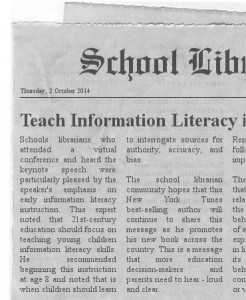 Last week, many of us had the pleasure of attending the Library Journal/School Library Journal The Digital Shift: Libraries @the Center Virtual Conference keynote speech by Daniel Levitin. I tuned in along with three colleagues, two of whom also teach preservice school librarians, and one who has young children of his own. Dr. Levitin’s speech “Libraries, Archives, and Museums at the Intersection of History and Technology” was a wonder.
Last week, many of us had the pleasure of attending the Library Journal/School Library Journal The Digital Shift: Libraries @the Center Virtual Conference keynote speech by Daniel Levitin. I tuned in along with three colleagues, two of whom also teach preservice school librarians, and one who has young children of his own. Dr. Levitin’s speech “Libraries, Archives, and Museums at the Intersection of History and Technology” was a wonder.
It is not often when a New York Times best-selling author shares the essential 21st-century role of librarians “who are trained in the art and science of identifying and sharing valuable information.” He described the Web as the “Wild West” and noted it is important to have “a class of people who are information specialists… who will not degrade authority.”
In his speech, Dr. Levitin recalled the day when his elementary school librarian took him from World Book to Encyclopedia Britannica. Later, she told him he was old enough to use encyclopedias as gateways but that he was ready to branch out and investigate primary and other secondary sources to answer his questions. In the information overload developed world of today, Dr. Levitin says the “primary mission of educating children should be to teach information literacy skills.” He recommends beginning at age 8 and notes that is when children should learn to interrogate sources for authority, accuracy, and bias. Bravo!
Dr. Levitin the author of The Organized Mind: Thinking Straight in the Age of Information Overload (Dutton 2014) is on a speaking tour to promote his new book. My hope is that he will continue to advocate for the library profession as he travels around the country.
So far I have only skimmed most parts of the book, but I believe Dr. Levitin provides useful strategies to help 21st-century technology-connected people manage information overload and ask the right questions of the information sources that affect our understandings and decision-making—in short, our lives. (Confession: I started by reading the last chapter “Everything Else: The Power of the Junk Drawer” due to the long-time different worldviews of my dear “piler” husband and my “filer” self.)
Dr. Levitin’s speech and his book reaffirm what many Building a Culture of Collaboration blog readers know: School librarians are needed to help students, educators, and families begin learning about information when children are in the early grades and continue to develop and refine their skills throughout their education and lives. School librarians can model and guide others in taking a lifelong stance of questioning information to ensure it is reliable and meets our information needs.
Thank you, Dr. Levitin.
Works Cited
Levitin, Daniel. “Libraries, Archives, and Museums at the Intersection of History and Technology.” Library Journal/School Library Journal The Digital Shift: Libraries @the Center Virtual Conference. 1 Oct. 2014. Web. 9 Oct. 2014. <http://www.thedigitalshift.com/tds/libraries-at-the-center/>.
Levitin, Daniel. The Organized Mind: Thinking Straight in the Age of Information Overload. New York: Dutton, 2014. Print.
Newspaper Clipping Image created at Fodey.com
